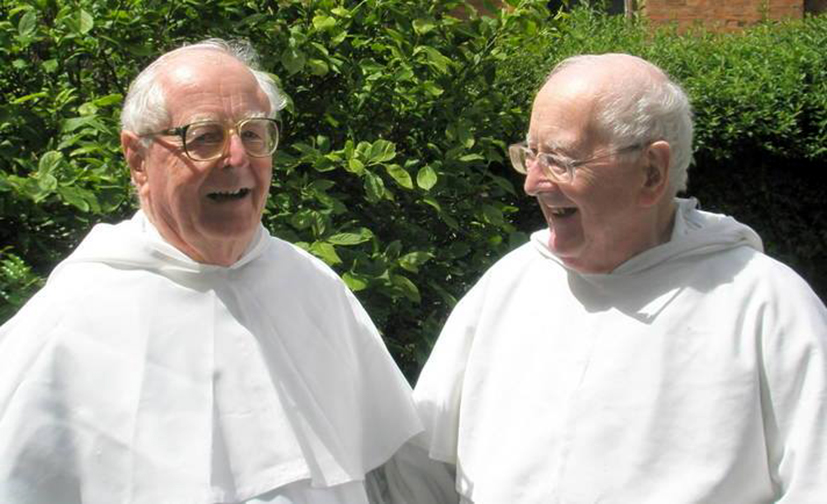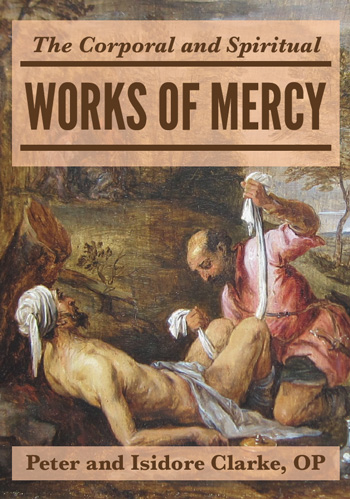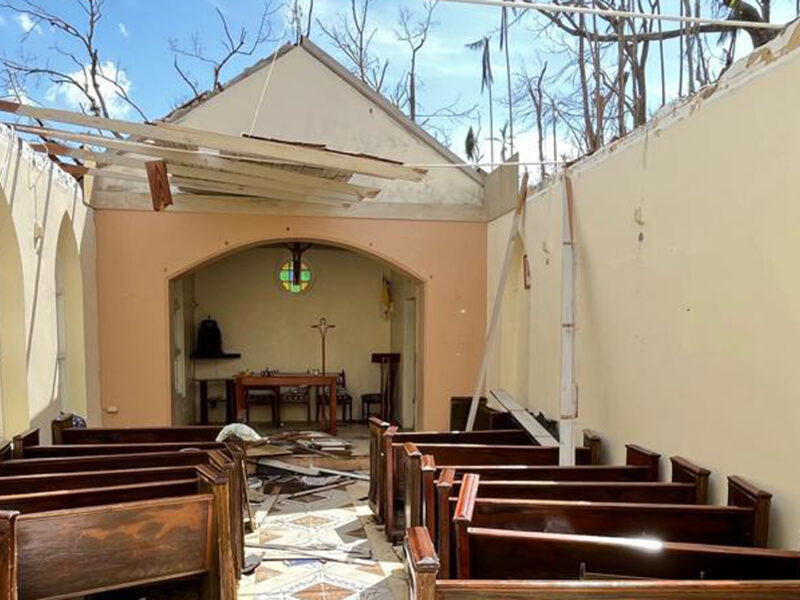
The Works of Mercy
 Twin brothers Peter and Isidore Clarke joined the Order of Preachers together in 1950 and, despite their geographical separation (Leicester and Grenada), for many years shared a popular online preaching ministry at mywaygodsway.blogspot.com
Twin brothers Peter and Isidore Clarke joined the Order of Preachers together in 1950 and, despite their geographical separation (Leicester and Grenada), for many years shared a popular online preaching ministry at mywaygodsway.blogspot.com
Following Peter’s death earlier this year, their reflections on the Works of Mercy were gathered into a book. Here we offer two extracts from it.
Fourth Corporal Work of Mercy: Sheltering the Homeless
‘Behold, I stand at the door and knock’ (Rev 3:20)
These words, taken from the Book of Revelation, are rightly understood to refer to Jesus knocking at the door of our lives, waiting patiently for us to open and make Him welcome. We’re warned against ignoring His knock or deliberately shutting Him out.
But our lives may be too rowdy and busy for us to hear Him, or we may deliberately ignore His knock. We fear He would be too demanding and would be an inconvenient embarrassment. We’ve all heard sermons on these lines. Some of us have preached them. Afterwards we’ve probably resolved to make Jesus more welcome in our daily lives.
But let us remember that Jesus has made it very clear that He identifies with those in any kind of need. In other words, Jesus Himself identifies with the thousands of refugees and asylum-seekers desperately fleeing their homeland, the runaway child, the tramp sleeping on the park bench. In them Jesus knocks on the doors of our lives, the doors of our affluent countries. In them Jesus begs for a home. In them Jesus begs to be made welcome. They need not just a roof over their heads, to protect them against the elements; they want the security of a place of their own, a place where they feel they belong, somewhere for them to have a decent quality of life. Most of us take all of this for granted for ourselves.
But now put yourself in the shoes of the person knocking at our doors. To be deaf to their plea for shelter, is to be deaf to these ‘other Christs’, longing, needing to make their homes with us. In them we react to the same Jesus, who prayed that we would abide in Him and He in us. If we shut Him out from our lives He will shut us out from His. That’s the clear, dire warning He gives at the end of chapter 25 of St Matthew’s Gospel.
In His own life on earth Jesus knew what it meant not to have a roof over His head. When there was no room at the inn He was born in a stable. Shortly afterwards, the Holy Family became refugees; they had to flee Herod’s persecution and seek sanctuary in Egypt. In this they identified with all refugees. Speaking of His ministry as a wandering preacher Jesus said, ‘The foxes have holes and the birds of the air have nests, but the Son of Man has nowhere to lay His head’ (Lk 9:58).
That is the lot of so many thousands of homeless people today. Jesus identifies with each one of them. In each one of them He knocks and waits. Will we open up and give them a home? Will we make Jesus-in-them welcome?
As individuals, we can’t solve the heart-breaking problem of so many rootless, homeless people. But we can urge our national and local government to act to provide them with homes. We can support and perhaps work with the various housing agencies and charities. But ideally, their homelands need to become sufficiently safe and prosperous, so that they can return, or better still, never need to leave.
But underlying our approach to the homeless must be the conviction that Jesus identifies with them in their need. Our attitude to them reflects our attitude to Him. If we shut them out, we shut Him out. In them Jesus appeals for our compassion. That should make us very uncomfortable!
Let us pray
Heavenly Father, the world is horrified by the number of homeless refugees and asylum-seekers. Armed conflict, economic hardship and starvation have forced them to leave their homeland, their loved ones and all their possessions. They’ve been forced to risk their very lives in an attempt to survive.
In their destitution they cry to You for help; they appeal to us in the prosperous developed world. If they are overwhelmed by their plight, so are we. And yet deep down we know we can’t simply brush them aside and say, ‘Not my problem’. We know that as fellow human beings, and as our brothers and sisters in Christ, their problem is our problem.
We pray for Your guidance in finding the best way to help the homeless. May we find ways to overcome the causes of their flight, so that they don’t feel the need to leave their homelands. Or if they have done so, may they be helped to return and rebuild what has been destroyed. In the meantime may we respond to their immediate needs, and provide them with the shelter and security they desperately require. Inspire us, as individuals and as nations, to be prepared to make the demanding sacrifice necessary for us to be of real assistance.
We ask this through Your Son, Jesus Christ, Our Lord, Who identified with the homeless in their need.
Fifth Spiritual Work: Forgiving Offences Willingly
I really put my foot in it when I gave a talk to a group of middle-aged women. I dared to criticise the cult film ‘Love Story’, which many of them had seen in their youth. I’d presumed to accuse their heroine of talking sentimental rubbish. Her crime? – to say, ‘Love means never having to say “sorry”.’
That can only be true of God, who never has to apologise. As for the rest of us, we’re all sinners and sometimes hurt each other. Real love then means being able to apologise when we’ve harmed someone, and forgiving him when he’s hurt us. If love is to last it must have the resilience to heal the pain we inflict on each other. Without mercy, love would be so brittle that it could not last. Our love for each other must reflect God’s steadfast love for us, which is always eager to forgive the repentant sinner. Jesus expressed that most powerfully in the parable of the Prodigal Son. There the loving Father eagerly welcomed back his repentant, wayward son (Lk 15).
But to forgive is hard enough; to do so willingly – that’s really difficult! Yet that’s what the Fifth Spiritual Work of Mercy expects of us. Forgiving those who hurt us is the most God-like of the Works of Mercy. Mercy is the very Face of the God in whose image we have been made. That means we must be as merciful as our heavenly Father is merciful (cf. Lk 6:36).
But that goes against our natural instinct. We fear that that will be taken as a sign of weakness. If we don’t stop him he will continue his violence. But we know only too well that if we retaliate the situation will escalate. The innocent person will become as aggressive as the one who started the violence. Nothing will be solved, and we may say and do things which we later regret.
So Jesus takes a different, two-pronged approach, aimed at defusing a hostile situation. Firstly, we should correct the offender (Third Spiritual Work of Mercy). Next, we should forgive him or her. That’s the present, Fifth Spiritual Work of Mercy.
So what does forgiveness mean? Certainly not denying that someone has harmed us. That would be dishonest. It would also be cruel to prevent him apologising and finding forgiveness. Only through apologising and forgiving can wounds be healed and peace restored. To say, ‘Forgive and forget’, is asking too much, even the impossible. We can’t wipe our memories clean, like a whiteboard. Instead, we have to learn to come to terms with past injuries, put them behind us and together make a fresh start.
To help us, Jesus urges us not only to love our enemies, instead of hating them, but also to pray for them. That’s not a pious after-thought, but an essential part in healing a dysfunctional relationship. As we pray for our enemies our attitude towards them changes. We cease to wish them harm and want only their good. That gradually heals our bitterness, anger and desire for vengeance. As we pray for those who are hostile to us, we ask God to heal their aggression. Only when hatred has been removed from both the aggressor and the victim can there be real peace. Shakespeare’s Merchant of Venice puts this very well, ‘The quality of mercy is not strained… IT BLESSETH HIM THAT GIVES AND HIM THAT TAKES’ (Merchant of Venice, Act 4 Scene 1). Both parties benefit from the merciful removal of hostility and tension.
But let’s face it, forgiveness can be very difficult when we’ve been badly hurt. We really want to forgive, but unwanted anger and resentment can suddenly flare up, sometimes long after the injury. We then wonder whether our forgiveness was genuine. It was. Such unwanted resentment simply means that the wounds we suffered are still raw. We don’t need forgiveness, but inner healing. Since the same may well be true for someone we’ve hurt, we will both need to be patient and pray. That links up with the previous Spiritual Work of Mercy – ‘to bear wrongs patiently’.
Jesus has given us the supreme example of what forgiving willingly means. He not only preached a Gospel of forgiveness, but lived it, above all, on the cross. As He prayed for the forgiveness of those responsible for His death He showed us what it means, in practice, to forgive our enemies. He has shown us the way to be true sons and daughters of our heavenly Father.
Let us pray
Heavenly Father, God full of mercy and compassion, we turn to you in our need for forgiveness. Your Son taught us that your mercy is dependent on our readiness to forgive those who have harmed us.
But when we’ve been harmed we find it so difficult to overcome our anger, bitterness and resentment. We feel hurt and humiliated. Instinctively we want to fight back; we fear that if we don’t, the aggressor will continue to repeat his violence. We know that one way or another he must be stopped. But your Son has taught us that retaliation is not the answer. Like Him, we must love and forgive our enemies. Like Him, we must be peacemakers, not warmongers.
Father, since such God-like generosity of spirit is so difficult we beg you to help us. Help us to overcome our instinct to retaliate; heal the wounds of resentment and anger which can still flare up long after we were first hurt.
Father, we know that, if there is to be true peace, the aggressor must be healed of the violence within him. And so we pray that he may find inner peace through loving and respecting the dignity and rights of other people.
May we all find peace through sharing your Son’s healing ministry of reconciliation. We ask this through Jesus Christ, Your Son, Our Lord. Amen.
 The 76-page book is available for just from £3.00 from Holy Cross Leicester and other Dominican priories or online via lulu.com.
The 76-page book is available for just from £3.00 from Holy Cross Leicester and other Dominican priories or online via lulu.com.


